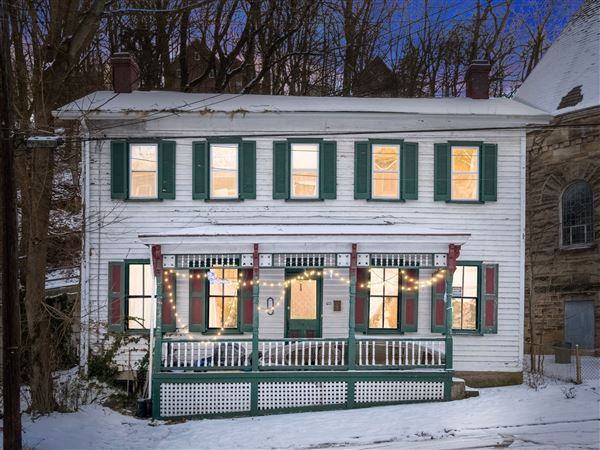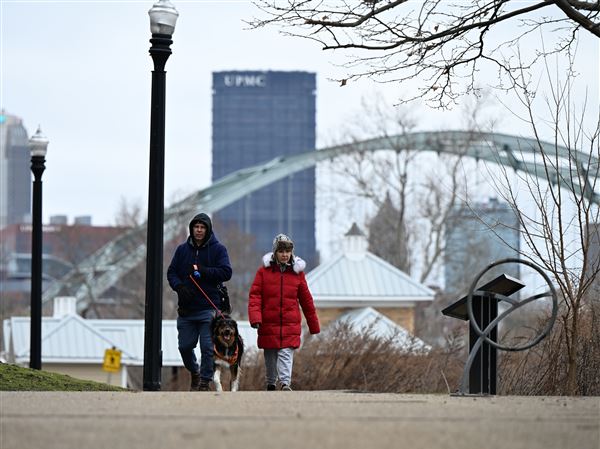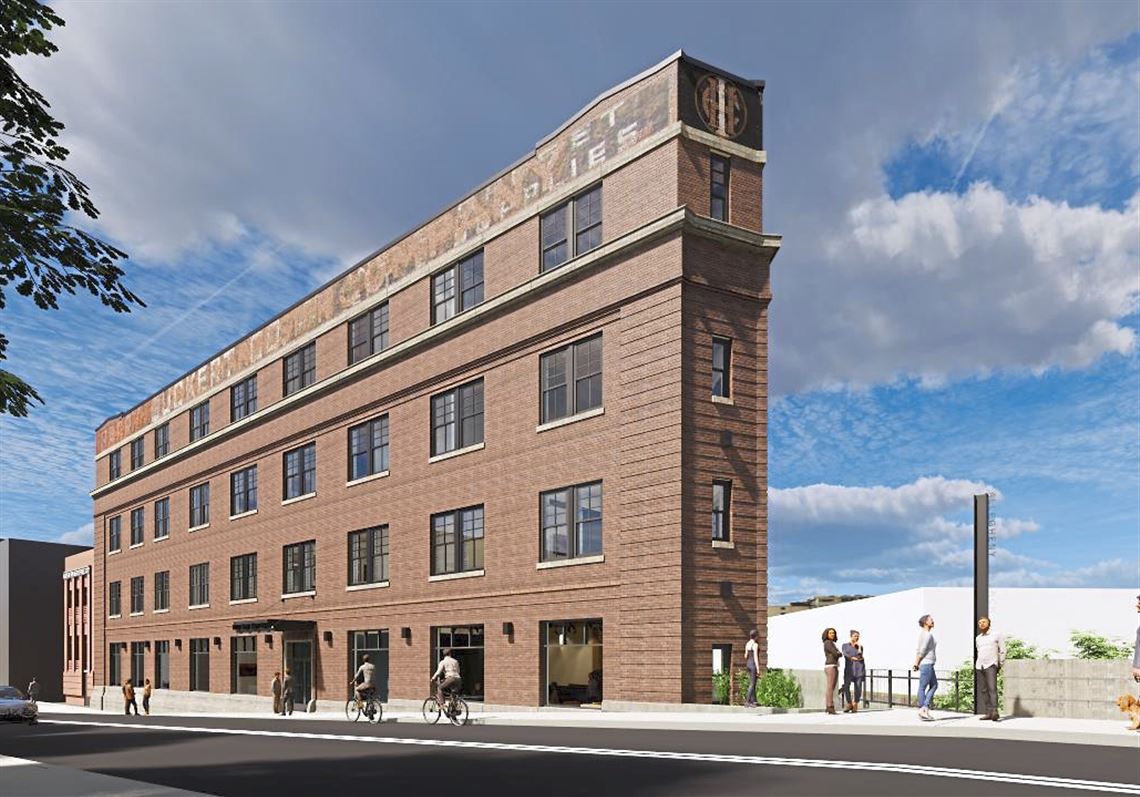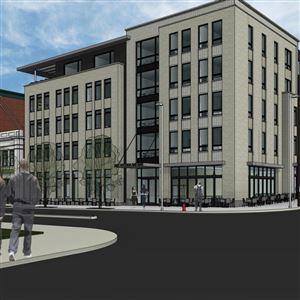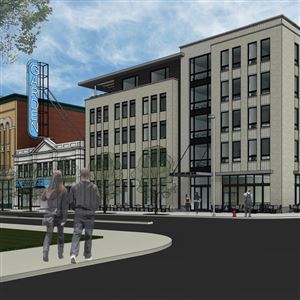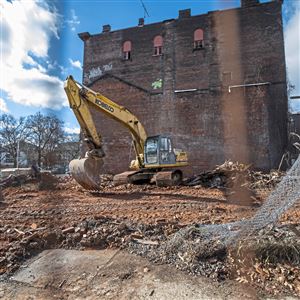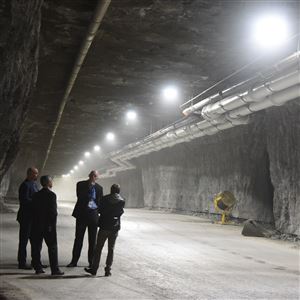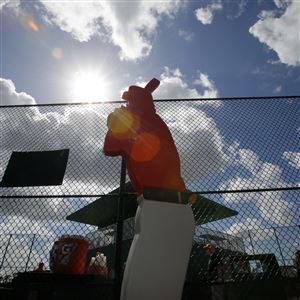A former branch house for International Harvester dating back to the early 1900s soon could become a home for those looking for a place to settle down on the North Side.
Q Development is planning to convert the elegant four-story brick building at 810 West North Ave. into 38 apartments, including five two-story duplexes, while incorporating historical elements into the design.
They include a tin ceiling that was part of a second floor showroom for International Harvester equipment and vehicles and four management offices on the same level.
The tin ceiling will be integrated into the apartments to be built on the floor as will the offices, with some being used for dens and others for bedrooms.
“We’re trying to pay homage to the history of the building. It’s an industrial building. We want people to experience some of the industrial flavor of it,” said Rick Belloli, Q Development principal.
As a nod to that history, Q has dubbed the project Allegheny Branch House Lofts.
The North Side-based developer, which has been involved in several historic projects in the neighborhood, including the old Garden Theater, will go before the Pittsburgh Zoning Board of Adjustment on March 10 to seek a special exception and variance related to parking and a variance related to residential accessory uses.
In 2015, Q Development paid $1 million to buy the triangular-shaped building near the Brighton Road intersection from the Harry Guckert Company, which had been using it for its printing operations for decades.
Q leased the building back to Guckert until the printer moved to a new location about a year ago, clearing the way for the structure’s redevelopment, Mr. Belloli said.
The conversion is expected to cost nearly $15 million, with the developer seeking historic tax credits to finance at least part of it.
Current plans call for seven studio apartments, 23 one-bedroom units and eight two-bedroom units. Of the two-story duplexes, four will be one bedroom and the other will be two.
Rents are expected to range from a low of $1,000 a month to a high of $2,500 for a two-bedroom, two-bath apartment on the fourth floor.
Mr. Belloli said it’s too soon to say whether all will be market rate. Q believes “strongly in economic diversity” and may try to incorporate some affordable units into the mix.
The two-story duplexes will occupy the first floor and a lower level connected by staircases. Q plans to reconstruct the loading dock outside the units to double as terraces.
In addition to the duplexes, the lower level, featuring 12-foot ceilings and timber construction, will include amenities like a workout room, yoga studio, a home theater set up with a big-screen TV, a workshop and tool room, a dog-washing station and tenant storage.
Mr. Belloli said Q had its eye on the building while restoring the nearby Willock House, an Allegheny West mansion it acquired in 2014.
“Once we started working on that, we kept admiring the building. We eventually worked out a deal with” Harry Guckert Company, he said.
The building is listed on the National Register of Historic Places.
It was constructed as one of the last acts of the McCormick Harvesting Machine Company before a merger with four other harvesting concerns birthed the creation of the International Harvester Company.
North Side development
The building served as a regional branch house for sales, distribution and service of agricultural implementations and motor trucks and was part of the company’s national expansion campaign.
It also is considered an example of the Classical Revival style of architecture that was widely used to convey International Harvester’s brand and success, according to a National Park Service summary.
The Pittsburgh branch ranked among International Harvester’s top branches in the country, the summary stated. The company’s equipment showroom was on the second floor and the rail line that runs behind the building was perfect for deliveries.
Q Development hopes to start the conversion this summer and have the first units available by the end of next year.
Mr. Belloli said his company engaged real estate specialists, neighborhood groups, residents and architects in trying to determine the “highest and best use” for the building before settling on apartments.
The rehab would add to the developer’s extensive work on the North Side.
In addition to the Willock House and companion three-story Carriage House, it rehabbed the Katsafanas Coffee Company building at 828 West North Ave. to include its headquarters and other office space.
In the Garden Theater block on West North, it was involved in the renovation of the 16-unit Bradberry apartment building. It also is working with Trek Development to add three apartments in the old theater, along with 46 in a new building at the corner and eight more in the adjacent three-story Morton House.
Mr. Belloli said Q Development was initially attracted to the North Side because of its building stock.
“We like historic properties and we try to be good stewards of these older buildings,” he said.
Mark Belko: mbelko@post-gazette.com or 412-263-1262.
First Published: February 22, 2022, 10:45 a.m.
Updated: February 22, 2022, 11:08 a.m.


